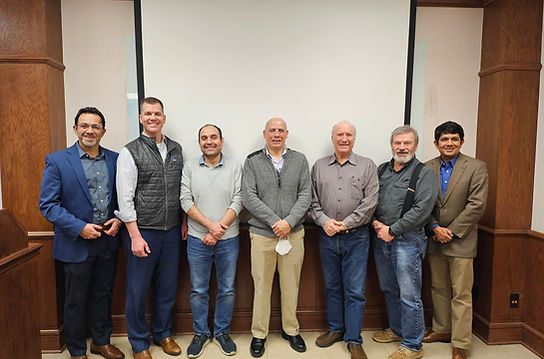
Sustainable Energy and Carbon Management Center
The Sustainable Energy and Carbon Management Center is committed to advancing research in hydrogen, energy storage technologies, carbon capture and storage techniques, energy efficiency, sustainable transportation systems, circular economy initiatives, and effective energy policies and economics. Join us in creating a sustainable future for our planet.

Our Research
Hydrogen Energy
Our research in hydrogen energy technologies spans various facets, encompassing generation techniques, storage methods, transportation, and utilization in energy systems. We employ experimental test setups and sophisticated computational models to enhance comprehension and performance evaluation of hydrogen systems. Our focus extends to in-depth studies on hydrogen blending for combustion efficiency, optimizing hydrogen transportation and utilization. The integration of hydrogen into existing energy systems is pivotal, with extensive research conducted on commercial and residential buildings, as well as hybrid vehicles. Additionally, we sponsor practical research on the integration of fuel cell systems with UAVs, conducting analysis tests at high altitudes to understand hydrogen system operation. Collaborating with a local company we are actively developing underground hydrogen storage systems for use in fuel stations.

Energy Storage
Our research is dedicated to exploring diverse technologies for innovative energy storage systems. We have undertaken extensive investigations into reversible fuel cell systems, examining their integration with fossil fuel assets. In a recent DOE project, we have conducted a comprehensive study on a reversible methane electrochemical reactor based on protonic ceramic fuel cells, aiming for an efficient energy storage solution. We meticulously analyze fundamental processes to meet power plant integration requirements and performance criteria. Our overarching goal is to showcase the viability and advancement of this technology for large-scale energy storage, providing solutions to challenges faced by existing storage methods.

Recent Publications:
Lowering the operating temperature of protonic ceramic electrochemical cells to <450 °C, Nature Energy
Rationally designed negative electrode for selective CO2-to-CO conversion in protonic ceramic electrochemical cells; Nano Energy
Process-intensified protonic ceramic fuel cells for power generation, chemical production, and greenhouse gas mitigation, Joule
Carbon Capture, Storage and Utilization
Carbon management is a pivotal focus of our research, emphasizing the development of versatile and efficient chemical and membrane-based carbon capture technologies. We specifically target large-scale implementation, integrating seamlessly with both base-load and load-following fossil-fueled power plants, particularly amid high renewable energy integration. Our research addresses prevailing challenges through advanced modeling, simulation, and optimization techniques. To tackle the energy requirements and cost implications, we have crafted an efficient and flexible multi-stage carbon capture systems process, optimizing its design. Comprehensive techno-economic models have been formulated to evaluate potential designs and operating strategies for both chemical and membrane separation processes.

Recent Publications:
FLEXIBLE AND OPTIMAL CARBON DIOXIDE CAPTURE SYSTEM DESIGN FOR FOSSIL-FUELED POWER PLANTS
Advancing power plant decarbonization with a flexible hybrid carbon capture system
Efficiency and Flexibility Improvement of Amine-Based Post Combustion CO2 Capturing System (CCS) in Full and Partial Loads
Electrochemical Energy Systems
Electrochemical technologies, including fuel cells and electrolyzers, are poised to play a pivotal role in the mid- and long-term pursuit of energy sustainability. These innovations promise heightened efficiency and emissions reduction in energy production. However, formidable questions and challenges persist, spanning from fundamental operations to commercial viability. The intricate interplay of multi-scale physics and complex morphologies poses unique hurdles in deciphering device functionality. Integrated fuel cell and electrolyzer systems compound the complexity, with subsystems intricately linked through thermal, chemical, mechanical, and electrical couplings. Aligned with substantial DOE funding, our research spans fundamental analyses to large-scale evaluations of electrochemical energy systems. Our endeavors facilitate a profound grasp of device-level physics and a holistic comprehension of system-level functionality, unveiling opportunities and barriers critical to technology development and implementation.

Recent Publications:
Life cycle analysis of a hydrogen production system based on solid oxide electrolysis cells integrated with different energy and wastewater sources
Operational and scaling-up barriers of SOEC and mitigation strategies to boost H2 production- a comprehensive review
Process-intensified protonic ceramic fuel cells for power generation, chemical production, and greenhouse gas mitigation, Joule
Renewable Energy Systems
Our team boasts a robust background in renewable energy systems and their seamless integration with existing energy sources. Our cutting-edge field test lab is equipped with state-of-the-art solar, wind turbine, and energy storage technologies, providing students with invaluable hands-on experience in working with renewable energy systems. Beyond academia, our lab extends its support to companies, offering the opportunity to test their setups under authentic real-world operating conditions. This not only enhances student learning but also empowers businesses to validate their technologies effectively


Emissions Reduction
Our team has actively engaged in practical approaches and participated in DOE projects aimed at mitigating methane emissions from the oil and gas industry. Through comprehensive analyses, we have successfully designed retrofit kits capable of mitigating methane emissions from industrial engines. Currently, our group is exploring innovative concepts to create reactors that can seamlessly integrate with any fossil fuel asset, converting unburned hydrocarbons to hydrogen and isolating it from other gases. Additionally, we are developing advanced artificial intelligence tools to effectively manage engine performance. Our team has successfully engineered virtual sensors using off-the-shelf and cost-effective sensors, enabling the prediction of emissions from engines. Furthermore, we have devised techniques and methods to characterize emissions, identifying their sources and rates


Strategic Collaborators and Research Partners


Email: janet.allen@ou.edu
Professor, John and Mary Moore Chair
Co-directs the Systems Realization Laboratory
Research Focus:
Dr. Allen's research interests include:
-
Design of Evolving Cyber-Physical-Social Systems
-
Simulation Based Design
-
Managing Uncertainty in Design
Sustainability -
Design Pedagogy

Email: wmerchan-merchan@ou.edu
Associate Professor
Combustion , and Nanoparticle Laboratory (CPNL)
Research Focus
Dr. Merchan-Merchan's research interests include: Flame Synthesis of Transition Metal Oxide; Nanostructures for Energy Storage Devices and Medical Applications; Flame Synthesis and Characterization of CNTs and Fullerenes;
Combustion Emissions from Traditional- and Bio-fuels; Combustion & Plasma Processes
.jpg)
Email: karami@ou.edu
Associate Professor
Mewbourne School of Petroleum and Geological Engineering
Research Focus
Dr. Karami's research interests include:
Production engineering,
Multiphase flow,
Artificial lift,
Flow assurance

Email: shabgard@ou.edu
Associate Professor
Research Focus
Dr. Shabgard's research interests include:
Multiphase flow and heat transfer
Particulate flow
Computational fluid dynamics
Thermal energy storage
Heat pipes
Iman Ghamarian

Email: iman@ou.edu
Assistant Professor
Director of the Accelerated Materials Development Lab (AMDL)
Research Focus
Dr. Ghamarian's research interests include establishing methods for tuning structural materials by understanding the relationships between processing, microstructure, and properties.

Email: farrokh.mistree@ou.edu
Professor, L.A. Comp Chair
Co-directs the Systems Realization Laboratory
Research Focus
Dr. Mistree's research interests include:
-
Public Policy as an Evovling Cyber-Physical-Social System.
-
Designing as a Service for Small and Medium Sized Enterprises.
-
Rural Development

Email: sridhar@ou.edu
Professor, Interim Associate Dean for Partnerships
Director in the School of Computer Science and professor
Co-director of the Data Science and Analytics Institute
Research Focus
Dr. Radhakrishnan's research interests include Design, implementation and analysis of network protocols and algorithms for broadband, wireless, and mobile networks; IoT and SDN development; high performance computing



Education and Training
We offer education and training programs to individuals and organizations who are committed to creating a sustainable future for our planet.

Research Opportunities
We offer research opportunities for individuals and organizations who are interested in contributing to the development of sustainable solutions for our planet.

Collaboration
We work closely with partners from around the world to create innovative solutions to the world's energy and carbon management challenges. By collaborating with us, you will have the opportunity to contribute to the development of sustainable solutions for our planet.

Community Outreach
We believe that creating a sustainable future requires engagement with the community. We offer community outreach programs to educate individuals and organizations about sustainable energy and carbon management. Our programs include workshops, seminars, and community events.

We spearhead the Oklahoma Hydrogen and Fuel Cell Association, dedicated to empowering local communities and industries. Our mission is to educate on the advantages and benefits of hydrogen energy, fostering engagement in renewable sources. Join us in steering businesses towards sustainable practices for a greener future.
Join Us
Join us in creating a sustainable future for our planet. Contact us today to learn more about how you can get involved in our research, education, and community outreach programs.



Research Partners and Sponsors

















